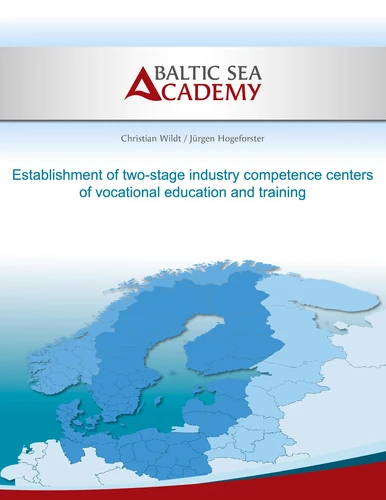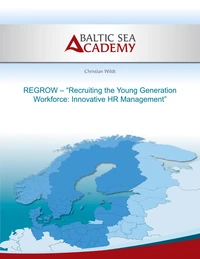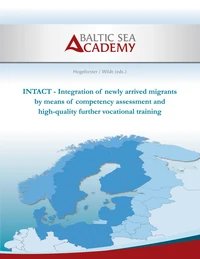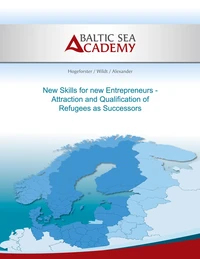Establishment of two-stage industry compe-tence centers of vocational education and training. ICC4VET
Par : , , ,Formats :
Disponible dans votre compte client Decitre ou Furet du Nord dès validation de votre commande. Le format ePub est :
- Compatible avec une lecture sur My Vivlio (smartphone, tablette, ordinateur)
- Compatible avec une lecture sur liseuses Vivlio
- Pour les liseuses autres que Vivlio, vous devez utiliser le logiciel Adobe Digital Edition. Non compatible avec la lecture sur les liseuses Kindle, Remarkable et Sony
 , qui est-ce ?
, qui est-ce ?Notre partenaire de plateforme de lecture numérique où vous retrouverez l'ensemble de vos ebooks gratuitement
Pour en savoir plus sur nos ebooks, consultez notre aide en ligne ici
- Nombre de pages442
- FormatePub
- ISBN978-3-7519-7604-6
- EAN9783751976046
- Date de parution04/08/2020
- Protection num.Digital Watermarking
- Taille3 Mo
- Infos supplémentairesepub
- ÉditeurBooks on Demand
Résumé
Almost all European countries face challenges in educating sufficient skilled workers. Particularly in countries with a predominantly school-based vocational training practical qualification takes mostly place only with complementary internships in companies; the relevant skills and competencies must be significantly improved and a high-quality must be achieved. The dual vocational training proved itself to be of high value in this context.
Within the ICC4VET project, a sector competence centre was developed in Poland with the realisation of a dual vocational training at the Tadeusz Tanski Mechanical and Logistics School Complex. In addition, further training courses for vocational school teachers were developed and implemented. Special trainings for trainers in SMEs in countries with school-based vocational training were adapted and implemented.
A further training course for technicians within the framework of a dual training course of two years with entitlement to study at a university of applied sciences was developed and implemented. In preparation for the introduction of dual Bachelor's programmes, implementation plans were drawn up for the expansion of the two-tier sector competence centres into a three-tier system of vocational training and innovation promotion. This publication contains the relevant curricula and experiences as a result of the project ICC4VET with the following partner: Baltic Sea Academy (DE), Vocational Training and Technology Centre of the Schwerin Chamber of Skilled Crafts (DE), Tadeusz Tanski Mechanical and Logistics School Complex (PL), Vilnius Builders Training Center (LT), Panevezys Chamber of Commerce Industry and Crafts (LT), Latvijas Amatniecibas kamera (LV), Võru County Vocational Training Centre (EE.)
Within the ICC4VET project, a sector competence centre was developed in Poland with the realisation of a dual vocational training at the Tadeusz Tanski Mechanical and Logistics School Complex. In addition, further training courses for vocational school teachers were developed and implemented. Special trainings for trainers in SMEs in countries with school-based vocational training were adapted and implemented.
A further training course for technicians within the framework of a dual training course of two years with entitlement to study at a university of applied sciences was developed and implemented. In preparation for the introduction of dual Bachelor's programmes, implementation plans were drawn up for the expansion of the two-tier sector competence centres into a three-tier system of vocational training and innovation promotion. This publication contains the relevant curricula and experiences as a result of the project ICC4VET with the following partner: Baltic Sea Academy (DE), Vocational Training and Technology Centre of the Schwerin Chamber of Skilled Crafts (DE), Tadeusz Tanski Mechanical and Logistics School Complex (PL), Vilnius Builders Training Center (LT), Panevezys Chamber of Commerce Industry and Crafts (LT), Latvijas Amatniecibas kamera (LV), Võru County Vocational Training Centre (EE.)
Almost all European countries face challenges in educating sufficient skilled workers. Particularly in countries with a predominantly school-based vocational training practical qualification takes mostly place only with complementary internships in companies; the relevant skills and competencies must be significantly improved and a high-quality must be achieved. The dual vocational training proved itself to be of high value in this context.
Within the ICC4VET project, a sector competence centre was developed in Poland with the realisation of a dual vocational training at the Tadeusz Tanski Mechanical and Logistics School Complex. In addition, further training courses for vocational school teachers were developed and implemented. Special trainings for trainers in SMEs in countries with school-based vocational training were adapted and implemented.
A further training course for technicians within the framework of a dual training course of two years with entitlement to study at a university of applied sciences was developed and implemented. In preparation for the introduction of dual Bachelor's programmes, implementation plans were drawn up for the expansion of the two-tier sector competence centres into a three-tier system of vocational training and innovation promotion. This publication contains the relevant curricula and experiences as a result of the project ICC4VET with the following partner: Baltic Sea Academy (DE), Vocational Training and Technology Centre of the Schwerin Chamber of Skilled Crafts (DE), Tadeusz Tanski Mechanical and Logistics School Complex (PL), Vilnius Builders Training Center (LT), Panevezys Chamber of Commerce Industry and Crafts (LT), Latvijas Amatniecibas kamera (LV), Võru County Vocational Training Centre (EE.)
Within the ICC4VET project, a sector competence centre was developed in Poland with the realisation of a dual vocational training at the Tadeusz Tanski Mechanical and Logistics School Complex. In addition, further training courses for vocational school teachers were developed and implemented. Special trainings for trainers in SMEs in countries with school-based vocational training were adapted and implemented.
A further training course for technicians within the framework of a dual training course of two years with entitlement to study at a university of applied sciences was developed and implemented. In preparation for the introduction of dual Bachelor's programmes, implementation plans were drawn up for the expansion of the two-tier sector competence centres into a three-tier system of vocational training and innovation promotion. This publication contains the relevant curricula and experiences as a result of the project ICC4VET with the following partner: Baltic Sea Academy (DE), Vocational Training and Technology Centre of the Schwerin Chamber of Skilled Crafts (DE), Tadeusz Tanski Mechanical and Logistics School Complex (PL), Vilnius Builders Training Center (LT), Panevezys Chamber of Commerce Industry and Crafts (LT), Latvijas Amatniecibas kamera (LV), Võru County Vocational Training Centre (EE.)







